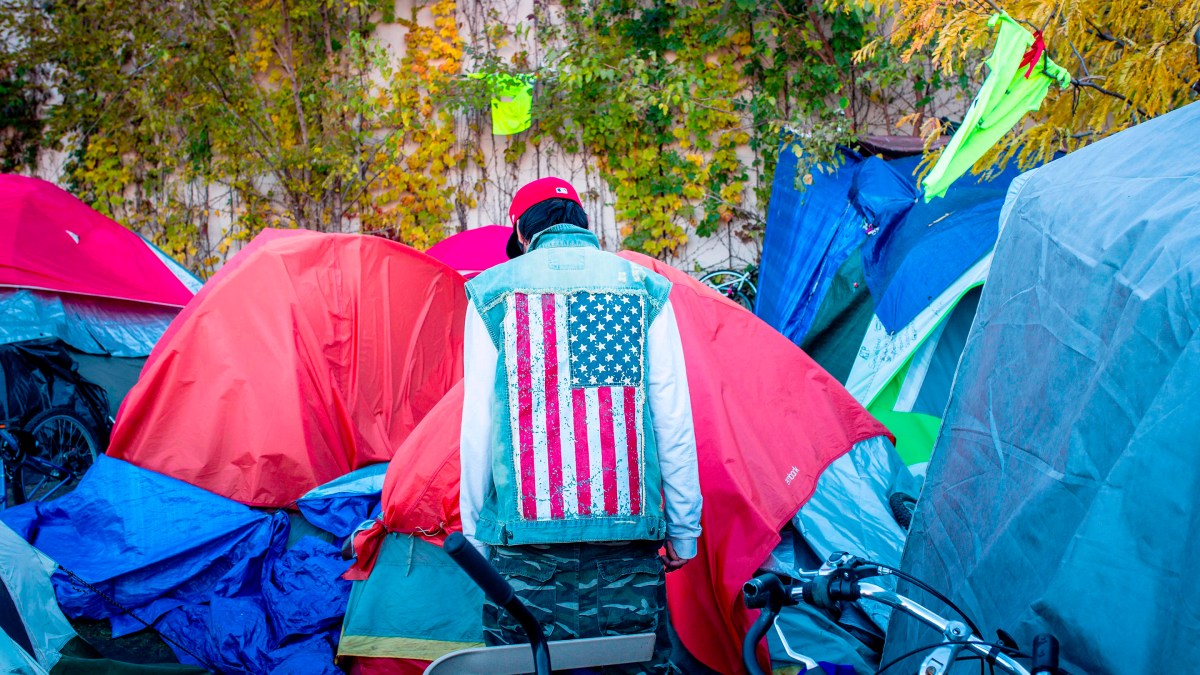COVID-19 makes a difficult voting process for people who are homeless even harder

Early voting is underway in a handful of states. The pandemic is making in-person polls risky while a postal service slow down could cause problems with mail-in ballots. Such challenges are magnified for a population that is hard to get to the polls in the best of times: those experiencing homelessness.
When you don’t have a permanent home, even the most basic steps of voting become daunting.
“You’ve got to register. You’ve got to have an address,” said Jeff Page, a longtime activist and resident of Los Angeles’ Skid Row, home to the largest concentration of homeless people in the country. “Well, how can we vote if I’m homeless on the sidewalk?”
People can use the address of a family member, a homeless service provider or even their physical location on the street to register, though it’s difficult to get voter information or mail-in ballots this way. Still, Page said, some do make the effort to cast their vote.
“A lot of people just want to be part of the process, because that’s the first problem, that people that are making decisions, they don’t have a clue as far as what life is like,” Page said.
John Maceri with the LA homeless service provider The People Concern said the county has rolled out a number of initiatives in the last year to boost turn out.
“The first is getting people registered. And the second is making sure that they can get to the polls,” Maceri said.
LA County residents can register and cast a ballot at any polling location regardless of their address. That includes several voting booths at homeless shelters that will open in the days before the election.
But even in states with less restrictive voting requirements like California, the pandemic is adding new challenges, said Nan Roman, president and CEO of the National Alliance to End Homelessness.
“Homeless people often use libraries, or if they have phones, they use coffee shops and so forth, to access the internet,” Roman said. “And they don’t have that access now in a lot of places, so just getting information about how to vote and what the issues are, it’s been affected a lot by COVID.”
People may also encounter greater difficulty obtaining proper ID — a necessity to vote in most states — because many government offices are operating with reduced hours and staff.
And while the ample availability of hotel rooms for makeshift housing has helped get some people off the streets, Roman said it’s likely a greater share have been pushed out of shelters and away from valuable voting resources.
“They thinned out their shelter populations in order to reach CDC goals about social distancing in shelters, and so people ended up on the street, some shelters closed,” she said.
Roman said efforts to get out the vote among the unhoused population can be resource-intensive at a time when many local governments are facing budget cuts and layoffs.
Stories You Might Like
What’s going on with extra COVID-19 unemployment benefits?
It’s been weeks since President Donald Trump signed an executive memorandum that was supposed to get the federal government back into the business of topping up unemployment benefits, to $400 a week. Few states, however, are currently paying even part of the benefit that the president promised. And, it looks like, in most states, the maximum additional benefit unemployment recipients will be able to get is $300.
What’s the latest on evictions?
For millions of Americans, things are looking grim. Unemployment is high, and pandemic eviction moratoriums have expired in states across the country. And as many people already know, eviction is something that can haunt a person’s life for years. For instance, getting evicted can make it hard to rent again. And that can lead to spiraling poverty.
Which retailers are requiring that people wear masks when shopping? And how are they enforcing those rules?
Walmart, Target, Lowe’s, CVS, Home Depot, Costco — they all have policies that say shoppers are required to wear a mask. When an employee confronts a customer who refuses, the interaction can spin out of control, so many of these retailers are telling their workers to not enforce these mandates. But, just having them will actually get more people to wear masks.
You can find answers to more questions on unemployment benefits and COVID-19 here.
As a nonprofit news organization, our future depends on listeners like you who believe in the power of public service journalism.
Your investment in Marketplace helps us remain paywall-free and ensures everyone has access to trustworthy, unbiased news and information, regardless of their ability to pay.
Donate today — in any amount — to become a Marketplace Investor. Now more than ever, your commitment makes a difference.
tinyurlis.gdv.gdv.htu.nuclck.ruulvis.netshrtco.detny.im
